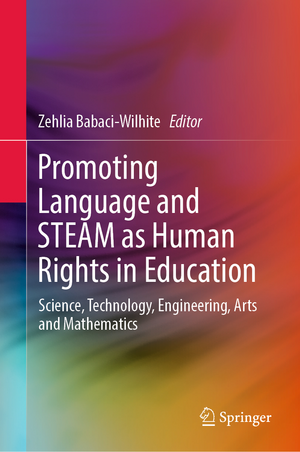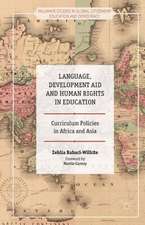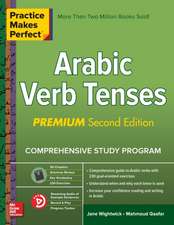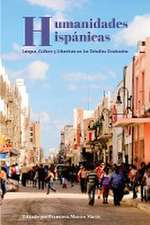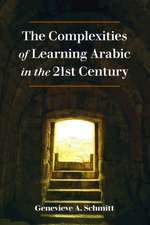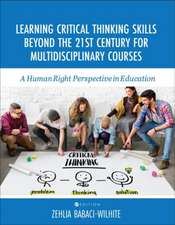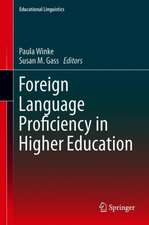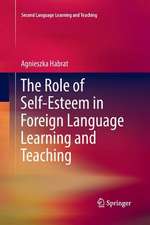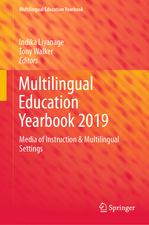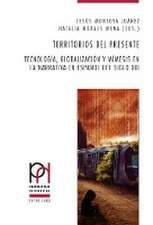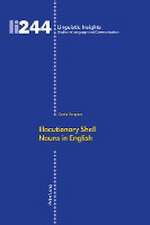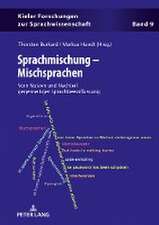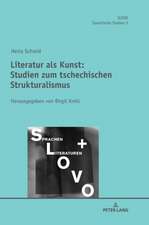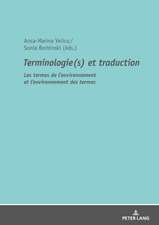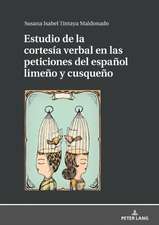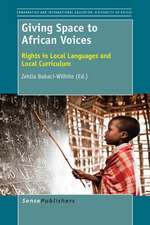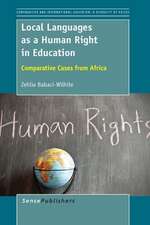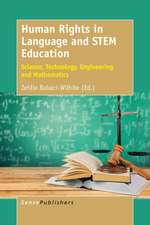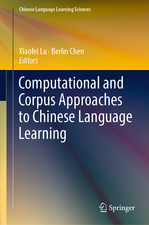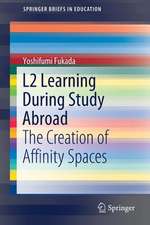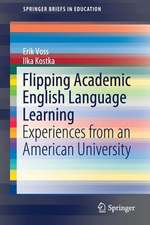Promoting Language and STEAM as Human Rights in Education: Science, Technology, Engineering, Arts and Mathematics
Editat de Zehlia Babaci-Wilhiteen Limba Engleză Hardback – 21 ian 2019
This book argues that integrating artistic contributions – with an emphasis on culture and language – can make Science, Technology, Engineering and Mathematics (STEM) subjects more accessible, and therefore promote creativity and innovation in teaching and learning at all levels of education. It provides tools and strategies for managing interdisciplinary learning and teaching based on successful collaborations between researchers, practitioners and artists in the fields of the Arts and STEM subjects. Based on contributions by educators, scientists, scholars, linguists and artists from around the globe, the book highlights how we can demonstrate teamwork and collaboration for innovation and creativity in STEAM subjects in the classroom and beyond.
Preț: 895.89 lei
Preț vechi: 1092.56 lei
-18% Nou
Puncte Express: 1344
Preț estimativ în valută:
171.42€ • 179.46$ • 141.85£
171.42€ • 179.46$ • 141.85£
Carte tipărită la comandă
Livrare economică 07-21 aprilie
Preluare comenzi: 021 569.72.76
Specificații
ISBN-13: 9789811328794
ISBN-10: 981132879X
Pagini: 251
Ilustrații: XXXVIII, 251 p. 33 illus., 26 illus. in color.
Dimensiuni: 155 x 235 x 19 mm
Greutate: 0.59 kg
Ediția:1st ed. 2019
Editura: Springer Nature Singapore
Colecția Springer
Locul publicării:Singapore, Singapore
ISBN-10: 981132879X
Pagini: 251
Ilustrații: XXXVIII, 251 p. 33 illus., 26 illus. in color.
Dimensiuni: 155 x 235 x 19 mm
Greutate: 0.59 kg
Ediția:1st ed. 2019
Editura: Springer Nature Singapore
Colecția Springer
Locul publicării:Singapore, Singapore
Cuprins
Section 1: Integrating Linguistic and Cultural Rights in STEAM subjects.- Ch. 1 Pedagogical tools to teach STEAM Subjects Integrating Linguistic Rights.- Ch. 2 Verbal Arts as Culturally Relevant Pedagogical Tools in Math/Science Education.- Ch. 3 Educating for or against Modernity, Arts and Technoculture.- Ch. 4 Art, Science and Language: Teaching Tools of Aborigines in India.- Ch. 5 Fictions as Heuristic Tools for a STEAM approach to education: Towards an Understanding of Agency as the Foundation of Linguistic.- Section 2: Technology in Design Curriculum, Engineering in STEAM Pedagogy
and the Arts.- Ch. 6 STEAM Education: Why Learn Design Thinking?.- Ch. 7 Using Technology to Scaffold Progressive Teaching.- Ch. 8 Embracing Creativity in K-12 Engineering Pedagogy
- Ch. 9 Making the Invisible Visible.- Ch. 10 Art as the Bridge to Science and Interconnectedness.- Section 3: Mathematics, Ethno-Mathematics and Medicine.- Ch. 11 Humanity Moving from Pre-Historic Times to the Future with Creative STEAM.- Ch. 12 Reflections on STEAM in Education.- Ch. 13 The Synchronicity of Art and Mathematics.- Ch. 14 The Hidden and Essential Narrative: Language and Visual Art as Learning Tools in STEM.- Ch. 15 Artists as Co-Teachers in the Field of Medicine.
Notă biografică
Dr. Zehlia Babaci-Wilhite is a Researcher at the Graduate School of Education and President of the Humanities and Social Science Association at the University of California-Berkeley, as well as an Adjunct Professor at the University of San Francisco and at Saint Mary’s College of California, USA. She is also a lecturer at San Jose State University. Dr. Babaci-Wilhite is affiliated with the Norwegian Center for Human Rights, and supervises students at the Department of Educational Research at the University of Oslo, Norway, where she obtained her Master’s and PhD in Comparative and International Education. She has taught courses and workshops in the USA, Norway, Japan, India, France, Tanzania, South Africa and Nigeria on issues related to language and culture, development and human rights. Her current research interests include Language and Science Literacy as a Human Right in Education, Development Aid, African Higher Education and Technology. Through her recent research projects, she has developed an interest in the pedagogy of Science, Technology, Engineering and Mathematics (STEM), putting the “A” in STEM and transforming it into STEAM. She is the author of many published articles in prominent academic journals, of several book chapters, and of two books: one on Local Languages as a Human Right in Education and the other on Language, Development Aid and Human Rights: Curriculum Policies in Africa and Asia. Dr. Babaci-Wilhite has also edited two volumes: Giving Space to African Voices and Human Rights in Language and STEM Education. She is fluent in French, English, Norwegian, Japanese and Berber, with knowledge of Arabic, Portuguese, German, Spanish, Swahili and Igbo.
Textul de pe ultima copertă
This book argues that integrating artistic contributions – with an emphasis on culture and language – can make Science, Technology, Engineering and Mathematics (STEM) subjects more accessible, and therefore promote creativity and innovation in teaching and learning at all levels of education. It provides tools and strategies for managing interdisciplinary learning and teaching based on successful collaborations between researchers, practitioners and artists in the fields of the Arts and STEM subjects. Based on contributions by educators, scientists, scholars, linguists and artists from around the globe, the book highlights how we can demonstrate teamwork and
collaboration for innovation and creativity in STEAM subjects in the classroom and beyond. The book reflects the core of human rights education, using local languages and local knowledge through art as a tool for teaching human rights at school, and bringing to light questions on diversity, ecology, climate change, environmental issues, health and the future of human beings, as well as power relations between non-dominant (minorities) and dominant (the majority) groups in society. “Zehlia Babaci-Wilhite’s edited volume is a boundary crossing and expanding work of impressive creativity. Promoting Language and STEAM Human Rights in Education successfully illustrates how
introducing the arts, language, multicultural, and social justice issues into the curriculum promises to provide a more humanistic, globally effective education for all.” —Robert F. Arnove, Chancellor’s Professor Emeritus of Educational Leadership Policy Studies at Indiana University, Bloomington, USA
“We live in a time where education is under pressure, first of all because it is reduced to being a tool for political and economic change, where the best of the student is predetermined by learning outcomes, and not guided by the open, searching and wondering way to knowledge and deeper insights. This book fills a huge gap with its though-provoking, relevant and hands-on reflection on the creativity, imagination and inquiry needed to awaken social justice in cross-cultural and multidisciplinary education. Using artistic processes, story-telling, fiction and art in STEAM, opens up the fundamental questions of morality and existence: What should be the purpose of education?
And how to live together?” —Inga Bostad, Professor of Philosophy, Department of Education, Faculty of Educational Sciences, University of Oslo, Norway
“This collection of essays challenges the status quo positions in education policy that (i) STEM can operate in a vacuum outside of culture, language, and artistic modes of expression, and (ii) STEM is superior to the arts and humanities with respect to understanding reality. While “STEM” connotesa rootedness and a base for growth, the addition of ‘A’ to “STEM” to make “STEAM” connotes power and direction. Both are important rootedness and growth as well as power and direction. With this volume as a guide, informed progress in debates about educational policy can be made.” —Anand Jayprakash Vaidya, Professor of Philosophy & Director of the Center for
Comparative Philosophy, San Jose State University, San Jose, California, USA
Caracteristici
Acknowledges both global and local contexts with an emphasis on multilingual and multicultural learning as a human right Promotes STEM in context through comparative and international education Exemplifies how local values and knowledge can enable relevant and lasting educational change
